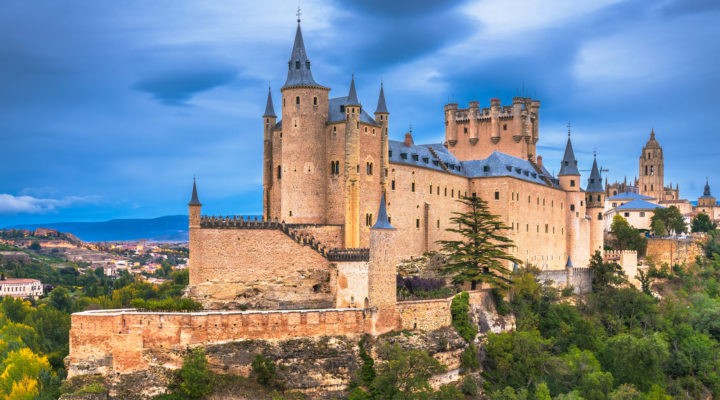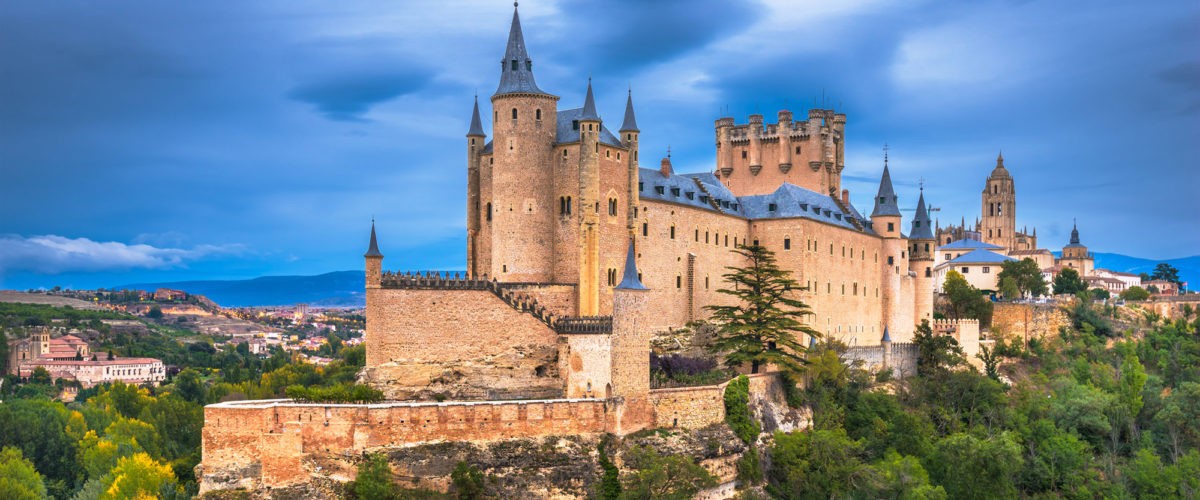One of my biggest disconnections with the Bible is regarding its kingdom language. I totally understand why the biblical authors used it. It was how people back then thought about ultimate reality. So, of course, God would be talked about as the ultimate king.
But we don’t really think of ultimate reality as thrones and palaces and robes these days. Even the few places that still have kings do not have them sitting on thrones, wearing crowns and wielding scepters.
It’s a little difficult for me to get excited about having a crown with jewels and laying it at the feet of a bearded male deity sitting on a giant throne and holding a scepter because I simply do not relate to that concept of reality at any level in my life. I don’t even feel the desire to have a crown of jewels to begin with.

Rick Pidcock
If you trace the development of human consciousness over the centuries, you’ll realize that we’re evolving out of monarchies into entirely new ways of being and relating in the world.
Does it make more sense that God would reverse that development and take us back to an outdated form of human consciousness and governance as the ultimate reality or that kingdom language was simply the biggest set of concepts they could think of back then and that ultimate reality will turn out to be far more than we can imagine?
If we assume the old language, then God’s plan for ultimate reality is limited to the confines of ancient human organizations that we developed and grew beyond. However, if we assume another model, then our assumptions about the kingdom need to be challenged.
Challenging our assumptions about ‘the kingdom’
One of my favorite passages in the Gospels is when Jesus challenges the assumptions about the kingdom of God in Luke 17:20-21. When the Pharisees asked Jesus about when the kingdom of God would come, Jesus said it’s “not coming with things that can be observed; nor will they say, ‘Look, here it is!’ Or ‘There it is!’ For, in fact, the kingdom of God is among (or within) you.’”
When I think about a kingdom, I think about something large, a realm of ruling and reigning. Kingdoms are territorial. So the discussion becomes one of defining power dynamics, boundaries and separateness.
A kingdom is inherently a hierarchical image because the king is the male at the top who rules and reigns over all that is beneath him in his territory.
“A kingdom is inherently a hierarchical image because the king is the male at the top who rules and reigns over all that is beneath him in his territory.”
If we think about God and creation in these terms, then God would be positioned at the top of the hierarchy, ruling and reigning over the entire space that God has conquered. If you define God’s conquering as applicable to those who have submitted to God’s reign through a belief in penal substitutionary atonement, then God’s rule extends to a limited number of humans. However, if you define God’s conquering as applicable to wherever death has reigned, then God’s rule extends far beyond simply a limited number of humans and reaches even beyond the human realm.
Ruling and reigning
If you see all creation in light of God conquering the wild and waste of the chaos waters in Genesis 1, or in light of reconciling all things on earth or in heaven in Colossians 1, that means God rules and reigns over the entire universe.
Of course, one might wonder how God could be ruling and reigning over the entire universe when there has been so much death and destruction. Was God ruling and reigning during the attacks on 9/11? Is God ruling and reigning during the raging wildfires on the West Coast or during the hurricanes on the East Coast? If God was ruling and reigning, then was God crushing, burning or drowning people? If God wasn’t ruling and reigning, then why would God step aside and allow that to happen?
However God is positioned in those scenarios, the kingdom language of ruling and reigning over it doesn’t quite seem to be the most relevant or helpful image for our modern understanding of the cosmos. Unlike the ancient understanding of the cosmos, weather patterns and human behavior are not determined by territorial deities.
“The kingdom language of ruling and reigning over it doesn’t quite seem to be the most relevant or helpful image for our modern understanding of the cosmos.”
When I consider modern astrophysics and quantum physics, it becomes much harder to imagine the entire cosmos as a kingdom. The unfolding story we are discovering doesn’t seem to reflect a kingdom. The universe hasn’t been a story of God conquering the wild and waste of literal chaos waters and establishing an earth-centric kingdom with a dome overhead.
The universe instead has been a far more ancient story of particles converging, bonding and evolving into greater wholes in an ever-growing and diversifying dynamic expansion of interrelated wholeness. Where is the throne? Where are the pillars of the earth or the windows of heaven? Where is the dome of heaven on which Yahweh walked as he looked down on the land he ruled over?
Jesus was saying in Luke 17 that we have our categories wrong, that the kingdom of God is not territorial. Yes, he was using “kingdom” language because that’s how people back then thought about ultimate reality. But he was pointing, not to a throne, pillars and a dome that can be observed or proved through science, but to the space within and among us. Where God is positioned is not at the top of our hierarchy, but within and among us.
Where is God?
So what is God doing within and among us?
Earlier in Luke, toward the start of Jesus’ ministry, Jesus said, “The Spirit of the Lord is upon me, because he has anointed me to bring good news to the poor. He has sent me to proclaim release to the captives and recovery of sight to the blind, to let the oppressed go free, to proclaim the year of the Lord’s favor.”
According to Jesus, God is positioned within and among us in a way that brings the good news of liberation, awareness, freedom and favor to the poor, the captives, the blind and the oppressed.
“God is positioned within and among us in a way that brings the good news of liberation, awareness, freedom and favor to the poor, the captives, the blind and the oppressed.”
This is not a ruling over, but a way of liberation. The liberating way of Jesus.
Understanding ‘the way’
One of the favorite verses of evangelical Christians is John 14:6, which says, “I am the way, and the truth, and the life. No one comes to the Father except through me.”
For most of my life, I have assumed that the way of Jesus meant a belief in penal substitutionary atonement. When well-known evangelical preachers are interviewed on cable news networks, they often quote John 14:6 as a way of telling everyone that they have to become evangelical Christians or face an eternity of burning in hell.
When Alisa Childers debated Lisa Gungor on the “Unbelievable” podcast, she said John 14:6 is a truth proposition that Lisa either had to accept or reject with the consequences for rejecting it being an eternal conscious torment in hell. But Childers was making a fundamental category error because the way of Jesus isn’t simply a truth proposition that we accept or reject.
Conservative evangelicals like Childers who claim to be biblical have packed so much into John 14 that the text doesn’t actually say. Instead, when we read about “the way” in the Gospels, we discover that the way of Jesus is not so much about a belief, but about an entirely new way of being.
A new way of being
Going back to Luke, when Zechariah prophesied over John the Baptist, he said, “And you, child, will be called the prophet of the Most High; for you will go before the Lord to prepare his ways to give knowledge of salvation to his people by the forgiveness of their sins. By the tender mercy of our God, the dawn from on high will break upon us, to give light to those who sit in darkness and in the shadow of death, to guide our feet into the way of peace.”
According to Zechariah’s prophecy, salvation and forgiveness were assumed. Our relationship to salvation and forgiveness simply was to become aware of it.
The imagery of sitting in the darkness of the “shadow of death” implies that there is a tall structure reaching to the heavens that produces a shadow of oppression. It’s an image of sitting in bondage under the shadow of the tower of hierarchy.
Hierarchy is a system of honor and shame between superior and inferior beings where relationship is made possible through the submission of inferior beings to the superior beings higher up in the hierarchy and through the violent punishment of all who do not submit.
“Retributive justice and penal substitutionary atonement are the ultimate hierarchies.”
Retributive justice and penal substitutionary atonement are the ultimate hierarchies. Retributive justice is God at the top of the hierarchy punishing with great torment those below who do not bend the knee to God’s higher status of authority and power. Penal substitutionary atonement is God the Father at the top of the hierarchy punishing Jesus on the cross below so that a relatively few number of people can get into the heavens up there while the masses get sent to hell down there.
But a belief in the divine flexing of hierarchical power doesn’t seem to fit with the tenderness of God that Zechariah was talking about.
The way, according to the Gospel of Luke, was not a belief in penal substitutionary atonement, but was a process of having our feet guided into the way of peace in light of the salvation, forgiveness and tender mercies of God that shine the light on the shadows of hierarchy.
Being guided into the way of peace
The degree to which the hierarchy has been revealed for the oppression-producing tower of death that it is, is the degree to which we are free to stand up and begin walking out of its shadows and into the way of peace.
The call for us today is to be humble enough to have our assumptions about the kingdom challenged, to re-imagine where God might be within and among us in light of our growing understanding of ultimate reality, to listen to the marginalized and the oppressed sitting in the shadows of the hierarchical towers of death that we have built using their bodies, and to walk step by step with one another out of the shadows of hierarchy and into the way of peace.
It’s there in the circle dance of converging love outside the hierarchies that we’ll discover a presence within and among us that we never knew before. And if Jesus was right about ultimate reality, that’s where God is.
Rick Pidcock is a freelance writer based in South Carolina. He is a former Clemons Fellow with BNG and recently completed a master of arts degree in worship from Northern Seminary. He is a stay-at-home father of five kids and produces music under the artist name Provoke Wonder. Follow his blog at www.rickpidcock.com
Related articles:
Christian America’s betrayal of the kingdom of God | Opinion by Richard T. Hughes
The kingdom of heaven is like the opening ceremony of the Olympics | Opinion by Patrick Wilson
For all who seek to follow Rabbi Jesus, now is exactly the time to be political | Opinion by Laura Mayo


